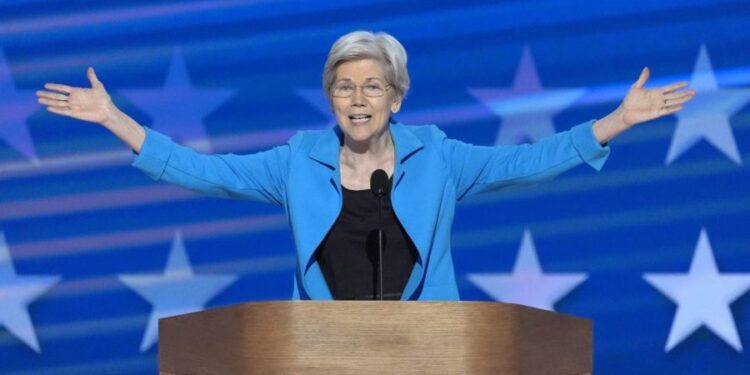
An interview between Sen. Elizabeth Warren (D-Mass.) and CNBC host Joe Kernen boiled over Friday morning, when the two sparred over Vice President Harris’s recent pledge to ban price gouging if elected in November.
Harris unveiled her economic plans last week, including the proposed ban, which would give the Federal Trade Commission the ability to investigate companies that increase their prices during periods of higher inflation.
“This could be another tool in toolbox,” Warren said of the proposal, before Kernen interrupted.
“Senator how would this policy do that,” he asked.
Warren replied, “I let you finish your argument, did you invite me on here just to lecture to me.”
“The whole point is to get markets that are more competitive,” she continued. “That’s the job of the FTC. That’s something state attorneys general work on.”
“We just want to put one more tool in the toolbox when CEOs are going on the phone saying, Boy, inflation is great because it gives us a chance to drive up profit,” the senator added.
Kernen responded to Warren’s claims, calling Harris’s proposal a “fool’s errand” and an attempt to distract voters from “the real cause of inflation,” which he said includes supply chain issues and demand being “juiced” by stimulus bills like the 2022 Inflation Reduction Act.
“Is it not about diverting the attention away from the real issues that might actually help the middle class, that you always talk about helping,” he added.
Harris’s proposal comes amid concerns that Democrats are vulnerable to attacks on inflation since grocery store prices increased by more than 20 percent during the Biden administration. Much of that jump is tied to disruptions in supply chains exacerbated by the COVID-19 pandemic.
The proposal is part of a larger effort to lower grocery costs as Americans continue to confront inflation, which peaked at 9 percent in June 2022. Inflation fell below 3 percent in August for the first time since March 2021.
During the segment, Kernen also argued that there is “little evidence” that price gouging is tied to a spike in inflation since the pandemic and pushed the Massachusetts senator for evidence to back up the vice president’s claim.
Warren, who ran an unsuccessful presidential bid in 2020, pointed to an earnings call in which CEOs said the pandemic and ensuing inflationary spike were opportunities to drive up prices. She has previously criticized companies such as Tyson, Kroger and Chipotle for making those claims.
The senator also cited a report from progressive advocacy group Groundwork Collaborative, which concluded that a significant portion of inflation is driven by corporate price spikes.
Kernen dismissed the report, saying it was from a “liberal think tank.”
“If you don’t want to pay attention to the numbers, you can ignore them,” Warren said in response. “You can ignore the calls, but the reality is the American people know what’s happening in pricing.”
The CNBC host also pushed the Bay State Democrat on the proposal’s efficacy since inflation and prices seem to be going down.
“It’s not at all clear that prices have come down and companies, a lot of companies in very concentrated industries, have raised their prices and are sitting on much bigger margins than they were sitting on before,” she said.
Economists have debated the proposal’s efficacy, with Mark Zandi, the chief economist at Moody’s, saying that “aggressive or unfair pricing practices are at the bottom of the list of reasons” for high inflation.
Former President Trump, some business leaders and other Republicans have slammed Harris’s proposal, calling it an attempt to institute “socialist price controls.”
“Kamala Harris is a Trojan horse for nation-destroying spending, communist price controls and open borders,” the Trump campaign said in a release this week.
Nobel Prize-winning economist Paul Krugman dismissed claims that the proposal calls for price controls.
“I’ve been amazed at how many credulous commentators, and not just on the right, have asserted that Harris is calling for price controls, making her out to be the second coming of [former President] Richard Nixon if not the next Nicolas Maduro,” Krugman wrote in a column for The New York Times.
“This is a populist political gesture — a way to offer something to voters upset about high food prices. But just because something is popular doesn’t mean that it’s a bad idea,” he added.







